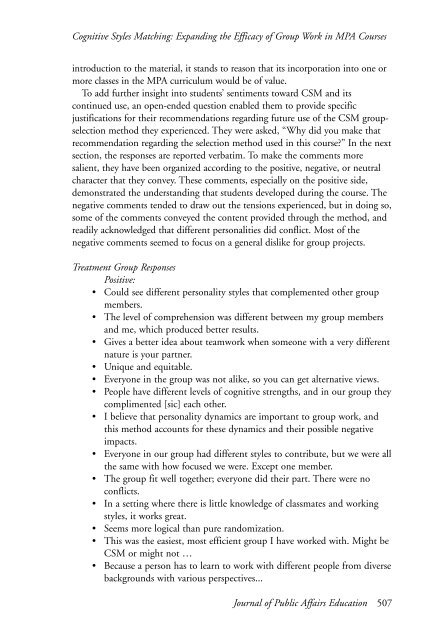JOURNAL OF PUBLIC AFFAIRS EDUCATION - National ...
JOURNAL OF PUBLIC AFFAIRS EDUCATION - National ...
JOURNAL OF PUBLIC AFFAIRS EDUCATION - National ...
You also want an ePaper? Increase the reach of your titles
YUMPU automatically turns print PDFs into web optimized ePapers that Google loves.
Cognitive Styles Matching: Expanding the Efficacy of Group Work in MPA Courses<br />
introduction to the material, it stands to reason that its incorporation into one or<br />
more classes in the MPA curriculum would be of value.<br />
To add further insight into students’ sentiments toward CSM and its<br />
continued use, an open-ended question enabled them to provide specific<br />
justifications for their recommendations regarding future use of the CSM groupselection<br />
method they experienced. They were asked, “Why did you make that<br />
recommendation regarding the selection method used in this course?” In the next<br />
section, the responses are reported verbatim. To make the comments more<br />
salient, they have been organized according to the positive, negative, or neutral<br />
character that they convey. These comments, especially on the positive side,<br />
demonstrated the understanding that students developed during the course. The<br />
negative comments tended to draw out the tensions experienced, but in doing so,<br />
some of the comments conveyed the content provided through the method, and<br />
readily acknowledged that different personalities did conflict. Most of the<br />
negative comments seemed to focus on a general dislike for group projects.<br />
Treatment Group Responses<br />
Positive:<br />
• Could see different personality styles that complemented other group<br />
members.<br />
• The level of comprehension was different between my group members<br />
and me, which produced better results.<br />
• Gives a better idea about teamwork when someone with a very different<br />
nature is your partner.<br />
• Unique and equitable.<br />
• Everyone in the group was not alike, so you can get alternative views.<br />
• People have different levels of cognitive strengths, and in our group they<br />
complimented [sic] each other.<br />
• I believe that personality dynamics are important to group work, and<br />
this method accounts for these dynamics and their possible negative<br />
impacts.<br />
• Everyone in our group had different styles to contribute, but we were all<br />
the same with how focused we were. Except one member.<br />
• The group fit well together; everyone did their part. There were no<br />
conflicts.<br />
• In a setting where there is little knowledge of classmates and working<br />
styles, it works great.<br />
• Seems more logical than pure randomization.<br />
• This was the easiest, most efficient group I have worked with. Might be<br />
CSM or might not …<br />
• Because a person has to learn to work with different people from diverse<br />
backgrounds with various perspectives...<br />
Journal of Public Affairs Education 507

















